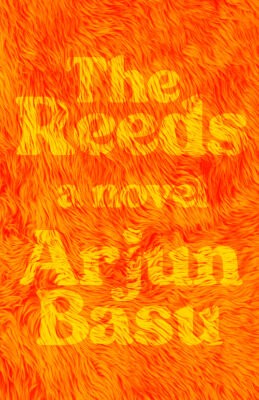Photo: Milo Basu
In Aesop’s fable, “The Oak and the Reed,” a mighty oak stands near a brook where slender reeds grow. When a hurricane rushes down from the north, the oak remains upright against the storm, while the yielding reeds sway. The oak breaks, torn up by its roots, but the reeds bend, never break, rebounding once the tempest passes.
In Arjun Basu’s warm, wickedly sharp novel, The Reeds, the titular family resembles the resilient grasses of this fable. Whatever life throws at them, they manage to adapt. “The story was inspired by an office tyrant that kept showing up in my ‘Twisters,’” Basu tells me over Zoom, referring to the flash-fiction posts, each under 140 characters, that he created on Twitter from 2009–2017, intrigued by the possibilities inherent in distillation. “I began to wonder what this guy was like at home with his family. He became the conduit through which I discovered the Reeds.” By the time Basu stopped posting Twisters, because Twitter refused to hold bullies accountable and increased its word limit, the stories numbered in the thousands.

The Reeds
Arjun Basu
ECW Press
$24.95
paper
360pp
9781770417434
The Reeds opens in Western Montreal in 2017. Trump is President of the US, Brexit has shaken up world dynamics, climate anxiety is hitting new highs, and the internet is buzzing with anonymous fame and instant cancellation. The Reeds are under pressure. Bobby, the father, is fired from his executive job and feels that the digital age “has rendered him mute and old and worthless,” while his wife, Mimi, is gaining success with her internet business, selling antiques that websites refer to as “hidden gems” and her husband denigrates as “kitsch.” In fact, she’s moved a million dollars worth of merchandise online and has caught the eye of investors. Mimi considers her work art: “curation as creation.”
Their eighteen-year-old son, Abbie, adopted from Ghana, is figuring out what is and isn’t art: he’s built a social media following with photographs of chimneys and smokestacks, accompanied by, wait for it… fruit. Abbie discovers he has a passion: “a strong force within him, a fire almost, if creating art is like controlling fire.” Sixteen-year-old Dee, adopted from a city outside Mumbai, is sensitive and empathetic, struggling with body dysmorphia and questions about her identity. Dee and Abbie share a strong sibling bond, and experience epiphanies which they share with one another before anyone else.
“Writing The Reeds was the first time I made an outline,” Basu tells me, chatting about his process. “I had four main characters and wanted to give them equal weight. So I made a map of the novel. I had an Excel spreadsheet colour-coded by character.” The novel took him a dozen drafts and three to four years to complete.
When I ask Basu how he decided to become a writer, he laughs. “I told a lot of lies as a kid. I was a big storyteller.” He grew up in a house full of books. “My mother was a reader. If I talked about an interest in whales, the next day I’d have a book on whales, thanks to my dad.” As a teenager, Basu went on Outward Bound, the survival wilderness camp. “They give you a journal,” he explains, “and leave you alone in the woods for three days. That’s the first time I wrote every day and it became an outlet.”
The Reeds is concerned with family first, the fickle nature of success, gender roles, metamorphic landscapes and the cost of gentrification, as well as the redeeming power of art, not to mention shag carpets and Korean fried chicken. “It’s a story about Western Montreal, where I grew up,” Basu says. “Not a part of the city that appears much in books, certainly not the neighbourhood tourists seek out. It was a great place to grow up, though at eighteen, I moved downtown.” Basu knows the city inside out: he’s spent his whole life here. Though he’s travelled widely and visited Calcutta, where his parents are from, he always comes back to Montreal, “where I feel whole. It’s home.”
The Reeds is a love song to Montreal in all of its gritty complexity and contradictions. Familiar settings are brought to life, such as the sad smell of the Côte St.-Luc shopping center where Mimi started her brick-and-mortar business, with its “weed-encrusted asphalt, that forlorn parking lot where wind always seems to howl.” Or the construction site near the Lachine Canal where Abbie does his photography and “a smokestack rises toward the sky, alone, surrounded by a field of … rubble.”
Basu is a stylist nonpareil, rolling out the occasional long, labyrinthian sentence that illuminates facets of character, advances the narrative, seasons it with humour, possesses a fluid rhythm, and culminates with a staccato punch: perhaps an itch he needed to scratch after writing all those Twisters! Here’s a classic example on page one, from Bobby’s point of view:
And there are moments when he feels his corporate power in this view, when he has fully transformed himself into the Senior Executive, usually as he enters the lobby twenty-six floors below, and this new man, this new power, surges to his loins, and he can imagine pleasuring himself by the floor-to-ceiling windows, spilling his seed softly on the innocent pedestrians below, a mist of his power and import, to prove himself that he would be capable of marking his might in that way, to be that kind of person—to know what that kind of power would feel like, had he the courage, which he doesn’t, he does not have that kind of courage, he never has, everything he has achieved here has been an act, learned; he is not the kind of man who would ever lower his zipper to do what he thinks he’d like to do in such a manner because, in the end, he can’t. For one thing, the windows don’t open.
Basu’s affection for his richly layered characters is infectious. His biggest challenge, he tells me, was imagining the relationship between Mimi and Dee. “That mother-daughter bond was furthest from my reality,” he says. “I wanted to make sure I got it right.”
The Reeds is a refreshingly big-hearted and optimistic novel, unique in centring a loving family, devoted to one another. I’ve never liked the clichéd term “dysfunctional” when applied to family: a family is not a machine. Yes, the Reeds are a bit kooky, but what family isn’t? It’s a joy to witness Bobby and Mimi, but especially Abbie and Dee evolve and grow into their own. Tolstoy may have gotten it wrong: Happy families are not all alike. They are each happy in their own way.mRb







0 Comments